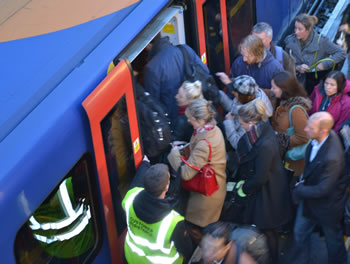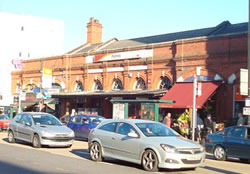Radical Plan to Combat Putney Station Crush
Surname alternation to be used to limit number of passengers
The problem of overcrowding at Putney station looks set to end thanks to a radical new plan to reduce the number of passengers using the station.
Following the example of cities like Athens and Paris which banned private cars with odd and even numbers on alternate days, from the beginning of April the station manager at Putney will have the power to restrict who uses the station by surname. The first time this happens people with names beginning with A-M will be prevented from accessing the platform, the next time those with names starting with N-Z will be barred.

Holders of a Freedom Pass, school children and key workers such as railway employees, TfL staff and senior officers at Wandsworth Council will be exempted from the restrictions.
The system works by using the information held on travelcards. If the card is placed in the reader on the incorrect day the barrier will not open. It is expected that these restrictions will only be necessary on days when the station is exceptionally overcrowded such as most weekdays. If someone really needs to travel by train they can still purchase a ticket from the machine although passenger movement simulations show that only 3% of passengers would be able to afford this on a daily basis.
The proponents of the scheme believe it will be very popular. A consultation was held from February 28th to 31st and a notice was published in the local paper. No negative comments were received from members of the public.
The move is felt necessary despite the introduction of longer trains. It is understood that South West Trains believe that their introduction could be counterproductive with regard to overcrowding. Having more capacity and allowing commuters the experience of travelling not packed in to a carriage like a sardine is only likely to encourage more people to use the service and ultimately will make the problem even worse. Train Operating Companies throughout the UK have used sophisticated capacity management techniques in the past such as cancelling trains at short notice and running behind schedule. Computer modelling has shown that making the passenger experience less than optimal discourages overuse of the service.
However, specialists now believe that techniques such as these have reached the limit of their usefulness as commuters stubbornly continue to use trains despite the disincentives put in place to reduce passenger load.
Planners have also been frustrated by attempts to introduce a second entrance to the station, an idea which recently attracted the support of the Putney Society. Professor Yuran Ap Rilful, of the Transport Imagineering Department at the University of Cleethorpes said, "By making a station easier to get into and out of you will just encourage people with claustrophobia and an irrational fear of suffocation and being crushed to death to start using it again. There needs to be an element of fear and risk on the part of travellers for a modern transport system to function."

The current entrance to Putney Station
Avril Amadan, Passenger Evaporation Executive with Cantbell, Eve, Uvelvorit, the consultancy who devised the scheme said, "What people need to realise is that making the trains run efficiently just leads to more people using them so delays and cancellations are in everyone's interest. Despite this the public continue to selfishly insist on using the service in the belief that paying a high price for a ticket gives them a right to do so. This kind of attitude is bringing the rail service to its knees so we have to introduce a plan to reduce the number of passengers."
April 1, 2014